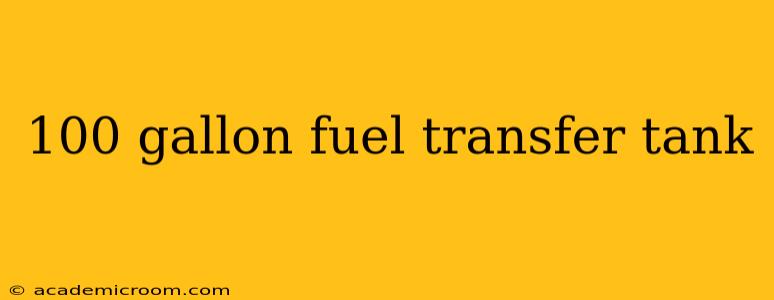Choosing the right fuel transfer tank is crucial for safety, efficiency, and compliance. This guide delves into the world of 100-gallon fuel transfer tanks, covering everything from their applications and features to choosing the best one for your needs. We'll also address common questions and concerns surrounding these essential pieces of equipment.
What are 100-Gallon Fuel Transfer Tanks Used For?
100-gallon fuel transfer tanks find applications across various industries and settings. They are commonly used for:
- Construction Sites: Fueling heavy machinery and equipment on large construction projects where readily available fuel sources are limited.
- Farming and Agriculture: Refueling tractors, harvesters, and other agricultural machinery in the field.
- Emergency Response: Providing a reliable fuel supply for emergency vehicles and generators during power outages or disaster relief efforts.
- Landscaping and Groundskeeping: Refueling landscaping equipment such as mowers, blowers, and trimmers.
- Fleet Management: Maintaining fuel supplies for fleets of vehicles, especially in remote locations or areas without readily accessible fueling stations.
- Oil and Gas Industries: Supplying fuel to equipment used in exploration and production operations.
The large capacity of a 100-gallon tank ensures minimal refilling, maximizing uptime and efficiency.
What are the Different Types of 100-Gallon Fuel Transfer Tanks?
Several factors differentiate 100-gallon fuel transfer tanks. Key distinctions include:
- Material: Tanks are commonly constructed from steel, polyethylene, or aluminum. Steel tanks offer durability but are heavier, while polyethylene tanks are lighter and more corrosion-resistant but may be less durable under extreme conditions. Aluminum tanks offer a balance of weight and strength.
- Mount Type: Tanks can be designed for stationary mounting, skid mounting (allowing for easy movement with a forklift), or for mounting on a vehicle (requiring specific attachment points and safety features).
- Features: Additional features can include integrated pumps, meters, overfill prevention systems, and filtration systems. The presence and type of these features significantly impact the cost and functionality of the tank.
- Fuel Type: While many tanks are designed for diesel fuel, some can accommodate gasoline or other specific fuel types. It's critical to choose a tank compatible with the intended fuel.
What Safety Features Should I Look For in a 100-Gallon Fuel Transfer Tank?
Safety is paramount when handling fuels. Essential safety features to consider include:
- Overfill Protection: This prevents accidental spills and potential hazards.
- Grounding Wire: Helps to prevent static electricity buildup, minimizing the risk of ignition.
- Spill Containment: A secondary containment system helps prevent environmental contamination in case of a leak or spill.
- Emergency Shut-off: A quick-release valve allows for immediate fuel flow interruption in case of an emergency.
- Vapor Recovery System: Minimizes fuel vapor emissions into the atmosphere.
Properly maintained and utilized fuel transfer tanks are safe, but neglecting safety features can lead to severe consequences.
How Much Does a 100-Gallon Fuel Transfer Tank Cost?
The price of a 100-gallon fuel transfer tank varies significantly depending on the material, features, and manufacturer. Prices can range from a few hundred dollars for a basic model to several thousand dollars for a tank with advanced features and heavy-duty construction. It's advisable to obtain quotes from multiple suppliers to compare pricing and features.
Where Can I Buy a 100-Gallon Fuel Transfer Tank?
100-gallon fuel transfer tanks are available from various suppliers, including:
- Online Retailers: Major online retailers often offer a selection of fuel transfer tanks.
- Industrial Supply Companies: These companies specialize in supplying equipment for various industries.
- Agricultural Supply Stores: These stores often carry tanks suitable for agricultural applications.
- Local Equipment Dealers: Check with local equipment dealers who may offer both sales and service for fuel transfer tanks.
Remember to always purchase from reputable suppliers who can provide information regarding safety certifications and compliance standards.
What Regulations Govern the Use of 100-Gallon Fuel Transfer Tanks?
Regulations governing the use of fuel transfer tanks vary by location and often depend on the type of fuel being transferred. Consult local, state, and federal regulations to ensure compliance before purchasing and using a 100-gallon fuel transfer tank. This may include obtaining permits or licenses. Failure to comply can result in significant fines and penalties.
This comprehensive guide provides a solid foundation for understanding 100-gallon fuel transfer tanks. Remember to prioritize safety and always adhere to applicable regulations when selecting, installing, and using this essential equipment.
